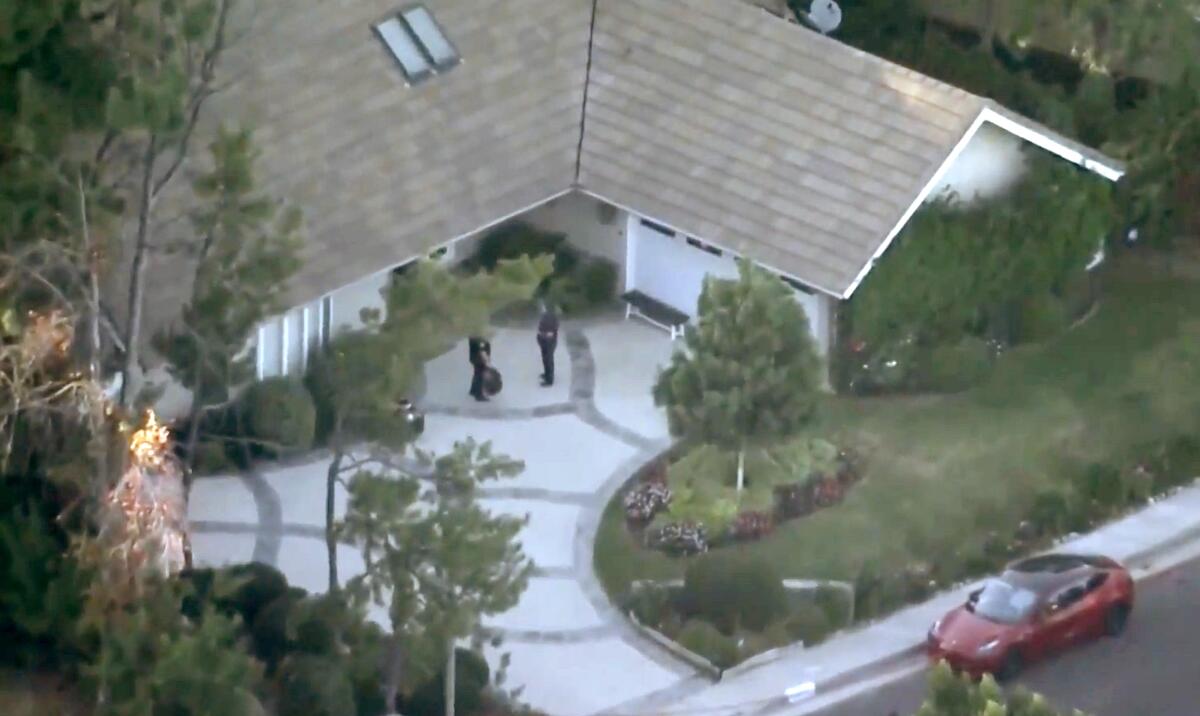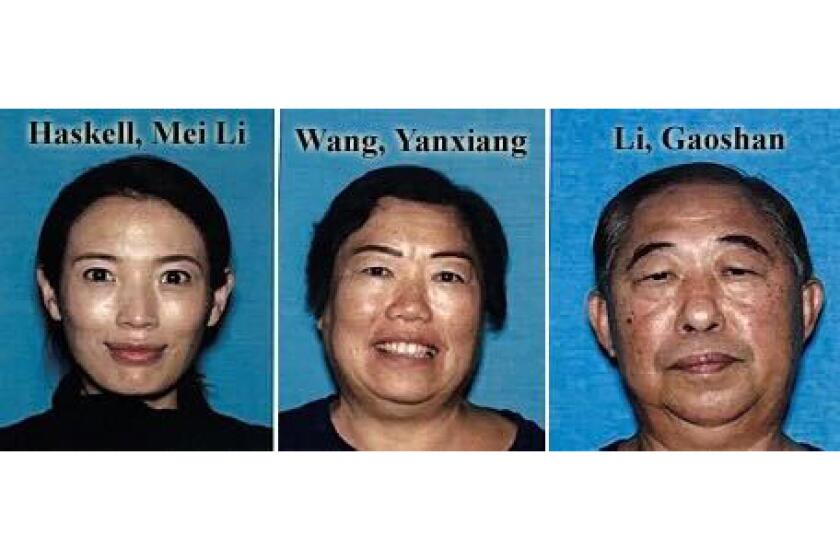LAPD looking into whether police turned away men who reported finding body parts

- Share via
The Los Angeles Police Department is investigating whether several men were initially turned away at a police station when they tried to report that someone paid them hundreds of dollars to dispose of human remains, Chief Michel Moore confirmed Tuesday.
The remains are believed to belong to Mei Haskell, whose husband, Samuel Bond Haskell, was charged Monday with three counts of murder in connection with the disappearance of his wife and in-laws.
Authorities said Haskell tried to get day laborers to remove what he said were several trash bags from his Tarzana home on Nov. 7. But after initially taking the bags, which weighed about 50 pounds, the men stopped their truck a block away, checked inside and saw dismembered body parts, identifying a belly button, and drove them back.
Haskell then reportedly loaded the bags into the back of his Tesla and drove them to Encino, where he dumped them — and was caught on video doing so.
In an interview with NBC4, one of the men said Haskell had tried to pay them $500 to haul away bags he first said were full of rocks, then later said contained Halloween decorations. But the day laborers told NBC4 the contents felt soft and soggy, like meat. “When we picked up the bags, we could tell they weren’t rocks,” one of the workers said in Spanish.
Los Angeles police are trying to sort out the mystery of a Tarzana man, three missing family members and body parts found in a dumpster.
The workers ended up at the LAPD’s Topanga-area police station, where they tried to lodge a report at the front desk but were told to call 911. The officer at the station desk did not speak Spanish and couldn’t understand the day laborers’ story, according to police sources who requested anonymity to discuss the ongoing investigation.
Speaking to reporters after Tuesday’s Police Commission meeting, Moore said the department had launched an internal investigation into the matter. Based on a preliminary inquiry, he said, the individuals were directed to the station after first going to a nearby state Highway Patrol office with “a report of concerns relative to the contents of some trash bags that they had been asked to dispose of.”
“They didn’t have those bags with them, [which] were back at the individual’s home or location where they had been asked to do this service, and they believed that the bags, as I understand it, contained potentially human remains,” Moore said during the news briefing. Instead, he said, the workers were instructed to go outside and call 911.
“My concern is that very act right there, of having them go outside and call 911 versus summoning a unit via other available channels and ensuring that the people remain there with their cooperation,” Moore said.
The chief said that a police squad was eventually dispatched to the location where the workers reported seeing the suspicious bags, but that officers did not find any remains. The following morning, a bag containing human remains was found in a “garbage container” some distance away, Moore said, and police eventually made the connection to the earlier report.
The case is being investigated by the department’s elite Robbery-Homicide Division.
An LAPD detective filed a legal claim against the city alleging sexual abuse in the locker room of the department’s football team.
The Los Angeles County district attorney’s office filed three special circumstances murder counts against Haskell, the son of a Hollywood executive. Haskell briefly appeared in a courtroom Monday, where a judge ordered that he be held without bail; his next court date is set for Dec. 8.
LAPD Capt. Scot Williams said police were still searching for Mei Haskell’s missing parents. “We have not found them yet,” he said. “Our search efforts continued today, but no luck. We are confident we are searching all the places we believe [Haskell] may have gone in the days leading up to his arrest.”
Moore said he was concerned that the workers weren’t immediately helped at the station.
Asked whether there was any reason the desk officer couldn’t have simply taken a report on the spot, Moore said he “didn’t have one in my mind.”
“The desk officer has at his or her disposal the watch commander on scene, so the supervisor there, they have radio communications that they can summon, communications that issue or dispatch units,” Moore said.
He said he had similar concerns in the case of Takar Smith, a man who was in the midst of a mental health crisis when he was fatally shot in his kitchen by LAPD officers in January after he wouldn’t drop a knife he’d picked up. Hours before the incident, Smith’s wife had walked into the Rampart police station to report he was behaving aggressively and was told to return to her apartment and call police from there. Moore said he also ordered a complaint investigation “regarding that action.”
More to Read
Sign up for Essential California
The most important California stories and recommendations in your inbox every morning.
You may occasionally receive promotional content from the Los Angeles Times.













